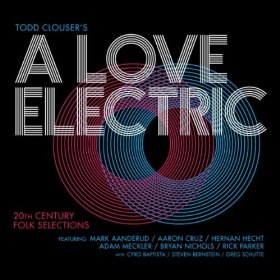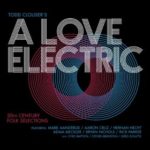
The Royal Potato Family
What would your definition of “20th century folk selections” be? On their album by that same name, jazz guitarist Todd Clouser and his ensemble A Love Electric make a case for Kurt Cobain and Eddie Vedder as folksters who deserve a spot on the shelf right alongside of Malvina Reynolds or Pete Seeger. And why not? If folk music is basically considered to be the music of the people, then what defines “the people”?
Let’s leave that debate alone for now, though. The fact of the matter is, Clouser and company don’t need to defend their choices of songs covered on 20th Century Folk Selections – the music does all the talking.
Rather than simply offering up jazzy instrumental covers of tunes, Clouser and A Love Electric make use of the genre’s freedom in a manner similar to dub: they deconstruct each song, seek out its soul, and then reconstruct the piece with the core emotions tweaked and intensified.
The old traditional “Pay Me My Money Down” is delivered as a demand without a lot of room for negotiation; The Beastie Boys’ “Gratitude” is loaded with street swagger, with enough revolving hands maintaining a core of funk at any given time to allow the rest to go apeshit; the Malvina Reynolds folksong “Little Boxes” swings easily from ominous lurch to blissful fingerpop and back again. And the jeepers-creepers singsongy vibe of Buddy Holly’s “Everyday” is replaced by a cool hipster approach. Where Buddy’s version cleaned its horn rims on its shirttail and poured its blushing-cheeked heart out, this version turns its collar up and flicks a butt into the gutter, jettisoning a stream of Lucky Strike smoke up toward the street light overhead. (Steve Bernstein guests on perfect-for-the-mood trumpet.)
At the heart of 20th Century Folk Selections are three songs that I personally think of as “The Junk Trilogy” (totally a product of my own mind – they’re actually not even successive tracks): Neil Young’s “The Needle And The Damage Done”; Nirvana’s “All Apologies”; and The Velvet Underground’s “Heroin”. The tie that binds the trio of tunes is smack – be it overdose, apathy, or celebration.
Young’s song is offered up with the gentlest arrangement of the three, all dreamy, wistful, and – beneath it all – sadder than hell. Clouser’s guitar wanders from the melody for a bit with its head down and shoulders hunched against the night. It eventually returns, having worked through some of the pain, but no closer to a resolution.
Remember that ratty, Beat-as-Beat-could-be sweater than Kurt Cobain was wearing during Nirvana’s legendary _MTV Unplugged _ performance? (Go look it up on YouTube if you need to; I’ll wait right here.) If that sweater were a musical instrument, the sound it would make is right here on Clouser and ALE’s version of “All Apologies”. Clouser leads the song in by the arm with Cobain’s signature guitar riff slowed ever so slighty; Hernan Hecht lays down a sparse, tom-heavy beat that’s lazy and cool and perfect; Aaron Cruz plays just enough bass to give the thing a pulse.
Adam Meckler takes the first verse with his trumpet, the notes barely clearing the bell of the horn at times and hardly giving a shit as it quietly nods off on the chorus. Mark Aanderud follows with a piano jam that shakes the song awake again; it meanders; it doubles back on itself and rethinks things; and by the chorus things are sounding soulful and strong. Clouser picks up the story from there: a midnight Mixolydian hip sway leads to moments of tension and confusion; junky flop sweat turns to funkiness by the chorus – we’re cruising now, baby … oh, yeah. Back to the main theme with Meckler’s trumpet sounding a little more sure this time – for a moment. Then things take a sickening lurch sideways; a quick brace-off to make the chorus; and then a final purge of ache as the song fades.
Then comes “Heroin”, ushered in with clanging dissonant percussion sounds and wandering horns and keys. Clouser starts the slow, plodding two-chord main theme with his guitar held in check – just enough Frisellish fuzz nastiness showing to let you know things could get ugly – and Meckler’s trumpet once again takes the lead. The piano settles into a gentle repetitive cascade as the drums flex, picking up the tempo slowly, bit by bit; the trumpet becomes bolder, going from slur to finger-pointing spit and the piano gets more insistent. The beat builds, going faster and faster (the part where ol’ Lou Reed would be singing, “When I’m rushing on my run/And I feel just like Jesus’ son”), until it eventually tumbles over itself in drowsy-lidded ecstasy.
Dig the second verse: all hands have already proven themselves as brilliant actors, but drummer Hecht takes things over the top with a couple of ever-so-subtle stumbles (memories of Lou: “Heroin – it’s my wife and it’s my life …”), letting the beat drag for a split second each time before snapping things back into focus. (“Cause when the blood begins to flow/When it shoots up the dropper’s neck …”) We have liftoff; we are soaring; we have a wave good-bye to all below – all the “Jim-Jims in this town/And everybody putting everybody else down.” And when it all comes apart at the end, spiraling down into a crashing heap (leaving the gentle piano to crawl clear of the wreckage), it really doesn’t matter anymore.
20th Century Folk Selections is said to be the first of three releases from Todd Clouser’s A Love Electric in 2012. I have three words for you, Mr. Clouser: Bring ‘em on.



No Comments comments associated with this post